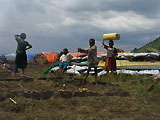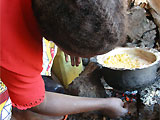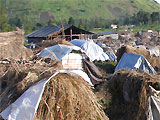Horrific sexual violence rife in eastern DRC
Save the Children Africa specialist Sarah Jacobs is in eastern DRC as the aid organisation launches its emergency response to renewed fighting in North Kivu province. She reports on the trauma the conflict is inflicting on thousands of families living in the region.
Rape is nothing new to Dr Claude Masumbuko. For the past five years he has been resident physician at Heal Africa clinic in the east of the Democratic Republic of Congo, which specialises in sexual violence and sexually transmitted diseases.

This barren field is now 'home' to some of the 176,000 people who have been forced to flee their villages
"The women and girls arrive here completely traumatised," he tells me, sitting in his small office at the busy hospital in Goma, the provincial capital of North Kivu. "They have often been rejected by their communities and are very depressed. The atrocities are terrible - we even have girls of three years old admitted for rape."
After more than a decade of civil war, the region has become associated with gross sexual violence. According to Human Rights Watch, 40,000 women and girls have been raped in DRC over the past six years. In the eastern provinces of North and South Kivu over the past year alone, the UN has registered tens of thousands of cases.

"I suffered a lot. I stayed for one week at home, bleeding"
But now even Dr Masumbuko can't believe what he is seeing. "We have never been this busy at the hospital, he says. "There are two or three new rape victims arriving here a day. It's a big increase. The military take whoever they want; they don't distinguish between adults and children. And what we're seeing is only the tip of the iceberg."
Some of the cases are so horrific, he says, he'll never be able to forget them. A few weeks ago a 13 year old was brought in who had been raped and then had a head of sweetcorn rammed inside her. By the time she arrived at the clinic it had been rotting there for two weeks.
Shortly afterwards, another girl died during while being treated at the clinic, her assailant having ripped out her vagina and rectum with the butt of his gun.
In September last year, to much fanfare, DRC held its first democratic elections. Observers hoped that for the first time, Congo's history of bad government and rebellious factions could be put rest. But for those living in the still-lawless east, there has been no such relief.
With attacks by militia groups once again increasing in intensity in North Kivu, and large numbers of troops being sent to the region, the all-too-familiar cycles of destruction, rape and violence that have plagued the country for the past ten years seem to have returned.

"Many of us have never re-found life"
I drive the 15 minutes from the hospital to Mugunga 2, one of the five sprawling camps on the outskirts of Goma. This barren field is now 'home' to some of the 176,000 people who have been forced to flee their villages in the past few months.
"Many of us have never re-found life," says camp secretary Benjamin Mafuluko Mugaliya.
He stands behind a battered table - there are no chairs - in a small hut he uses as the camp's headquarters. "People are suffering terribly. The militias come, burn our villages, kill and rape. It's very difficult for us trying to care for families here. We try to protect them but it's difficult, especially when children are going out into the village to try and earn money. They are exploited in and out of the camp."
In the labyrinthine pathways that thread between rows of close-packed tents, I come across Madeleine*, a quietly spoken 17 year old who arrived at the camp one month ago. She lives alone in a small shelter made from bamboo and banana leaves. When it rains, she tells me, everything gets wet. Plastic sheeting here is in short supply.
"When I'm in bed at night, it's frightening," she says, looking at the floor. "During the night people come by and pull up the blanket over the door. They look at me, and won't answer when I ask who they are."
Two months ago, she was raped by two militia men who found her working in the fields. "Each one took me," she says. "I suffered a lot. I stayed for one week at home, bleeding. I couldn't walk. Then my father threw me out because he thought I was pregnant and carrying an enemy child."
With me is Angelique Myirasafari, a social worker with aid organisation Save the Children, which is working with children in the camps around Goma.
"We help look after children who have been separated from their families, listening to their stories, helping them to get medical care, trying to trace their parents," she says.
"Sometimes you can't believe the stories you are hearing. The huge military build up in North Kivu means there are now tens of thousands of men patrolling the area, taking whatever they want from the population. Often children have been abused, or have seen members of their family raped, and the psychological effects can last their entire lifetime."
We walk back together across the camp to the charity's 'Listening Point', where children come to get help. "After ten years of fighting it feels like the country is on the brink again, and it can't be allowed to happen."
She waves her arm towards the door. "All these children want is to be at home with their families, going to school and able to be responsible for their own lives. If steps aren't taken now to calm this conflict, they're going to be the biggest victims."
*The name in this article has been changed




